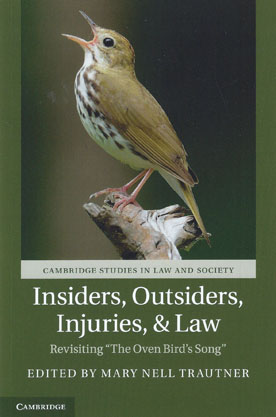
A central theme of law and society is that people's ideas about law and the decisions they make to mobilize law are shaped by community norms and cultural context. But this was not always an established concept.
Among the first empirical pieces to articulate this theory was David Engel's 1984 article, "The Oven Bird's Song: Insiders, Outsiders, and Personal Injuries in an American Community." Over thirty years later, this article is now widely considered to be part of the law and society canon.
This book argues that Engel's article succeeds so brilliantly because it integrates a wide variety of issues, such cultural transformation, attitudes about law, dispute processing, legal consciousness, rights mobilization, inclusion and exclusion, and inequality.
Contributors to this volume explore the influence of Engel's important work, engaging with the possibilities in its challenging hypotheses and provocative omissions related to the legal system and legal process, class conflict and difference, and law in other cultures.